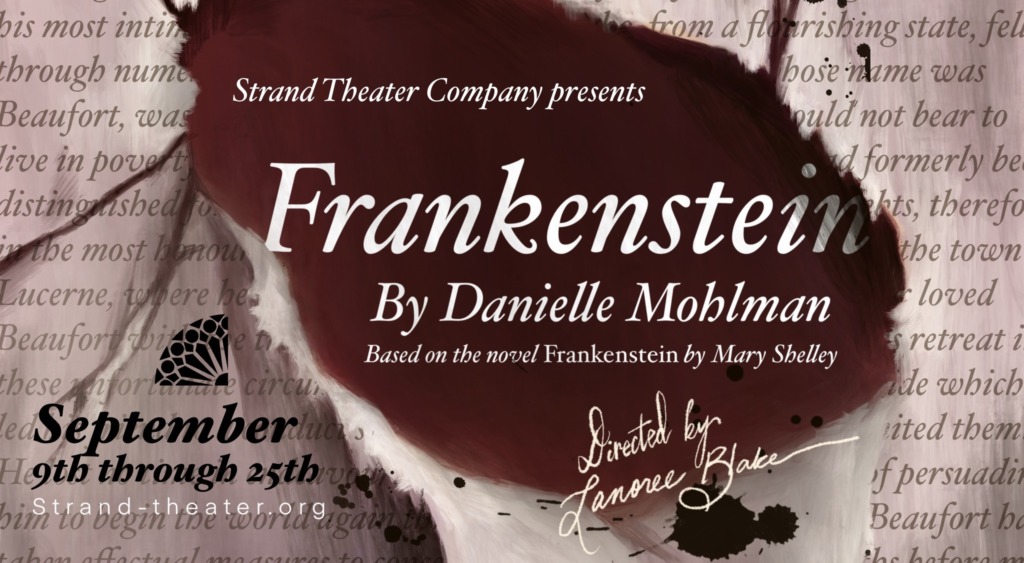Perhaps you’ve heard of a little novel called Frankenstein? I mean, it’s not like it was a genre-birthing novel or anything, right? So let’s say you are indeed familiar with the story of Western literature’s first documented foray into science-fiction. Well, Danielle Mohlman’s rendition of Frankenstein, directed by Lanoree Blake, is a different take on a story many of us know well but through a very strong feminist framing; a focus not only on the story told within in the novel, but also an imagining of the influences which surrounded its creation.
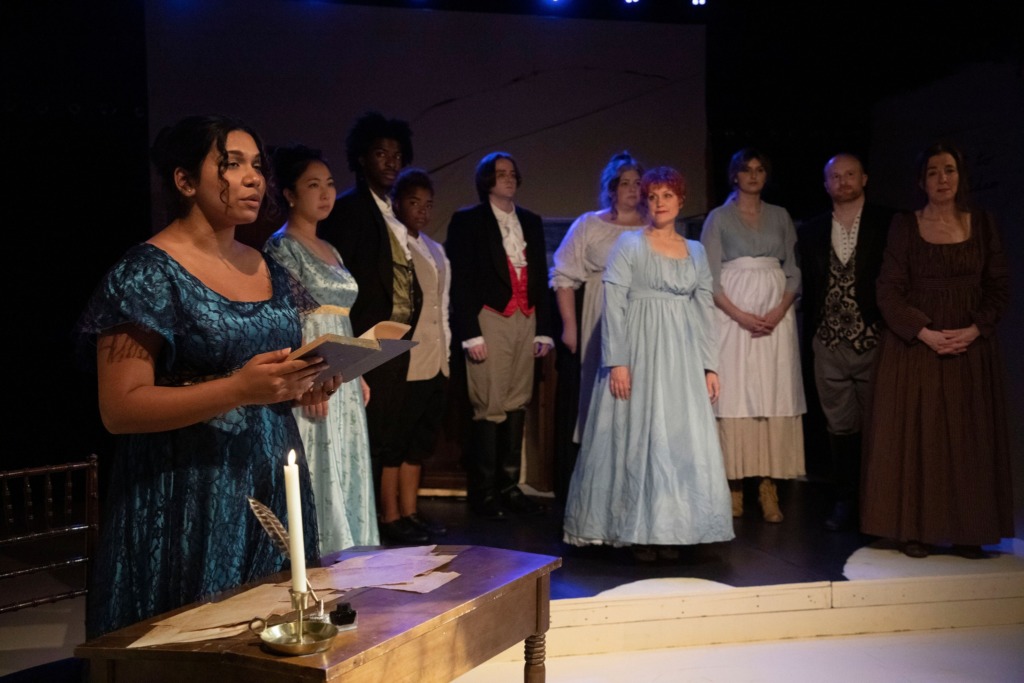
Where death resides, it is not unusual for those who survive to find a fascination with the macabre. Set in the era of its creation, England’s early Nineteenth Century / Regency Era, that is exactly where we find our young author. Lost in the throes of grief after the death of her infant daughter, Mary Shelley, played by Caitlyn Hooper, is left in a state of postpartum (and postmortem) depression. Deep in mourning, our young Mary is left to herself to feel all the grief which has impacted her young-life, causing the manifestation of her mother’s ghost (Mary Wollestonecraft), played by Nicolette Le Faye, to badger Mary into writing her now infamous novel.
Frankenstein may be the story of Victor Frankenstein’s ambitions to create life, but when explored by the all-too-common experiences of his feminine author, the story takes on a different angle. It is within this shift in focus that we see the real strength of Mohlman’s re-telling. Enshrouded by grief, Mary’s husband has the gall to host a party while his wife is still in mourning, and it is here where she directs her angst into the fleshing out of her novel. As we see the novelization take shape on stage, we see her husband Percy, played by Shaquan Pearson, take the role of the titular Victor Frankenstein, and Mary take on the role of his Creature.
Hooper does a fine job of transcending the pain of Mary’s existence into the manifestation of the Creature. While often separating the two in her action on the stage, it is clear that the agony felt by the two are one. Similarly, the choice to have the same actor play Mary’s husband and Victor, plays well to highlight Mary’s projection of the pitfalls of the masculine and feminine dynamics set in stone by society.
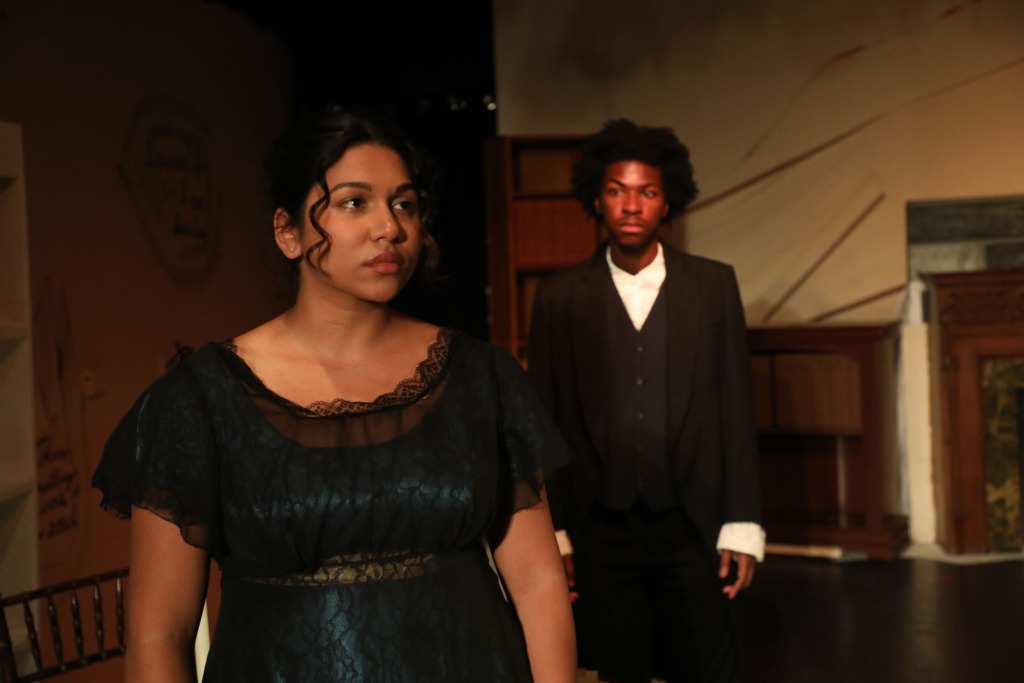
That being said, Pearson is interesting in his execution of Victor. While clear that he is a character manifesting as he is being written, his mannerisms are subtle and very even-keeled. It is as if his account of the character is left up to the interpretation of the audience even as his story unfolds before them. However there are a few moments where we see Pearson break from this. The first, and most endearing, being within the moments after he flees the creation of his Creature to his friend Henry (played by Jacob Albert Gross). Pearson and Gross create a very lovely moment of intimacy structured within the strict confines of Regency Era culture between two young men and their friendship/“friendship.”
But it is not just the influence of her husband that guides the action of the story. La Faye does an impeccable job at balancing the many aspects of her character as Mary’s long-dead mother. As a specter, La Faye not only encompasses the eerie ethereal energy of a mother returning to the side of the grieving daughter that she never knew (Wollestonecraft died shortly after Mary’s birth due to complications of childbirth), to the nagging muse who pushes Mary to complete her novel, to the empathetic and sympathetic woman of many women’s plight.
Also mastering her role of haunting (and haunted) mother is Caroline Frankenstein, played by Margaret Condon. Without giving too much away, I would be remiss if I did not highlight her absolute ascendancy of the embrace into madness which her character all too often displays. Fully enveloped by her character, Condon commands the empathy of the audience to her existence and the pains which she endures within her existence at the hands of Mary’s creations.
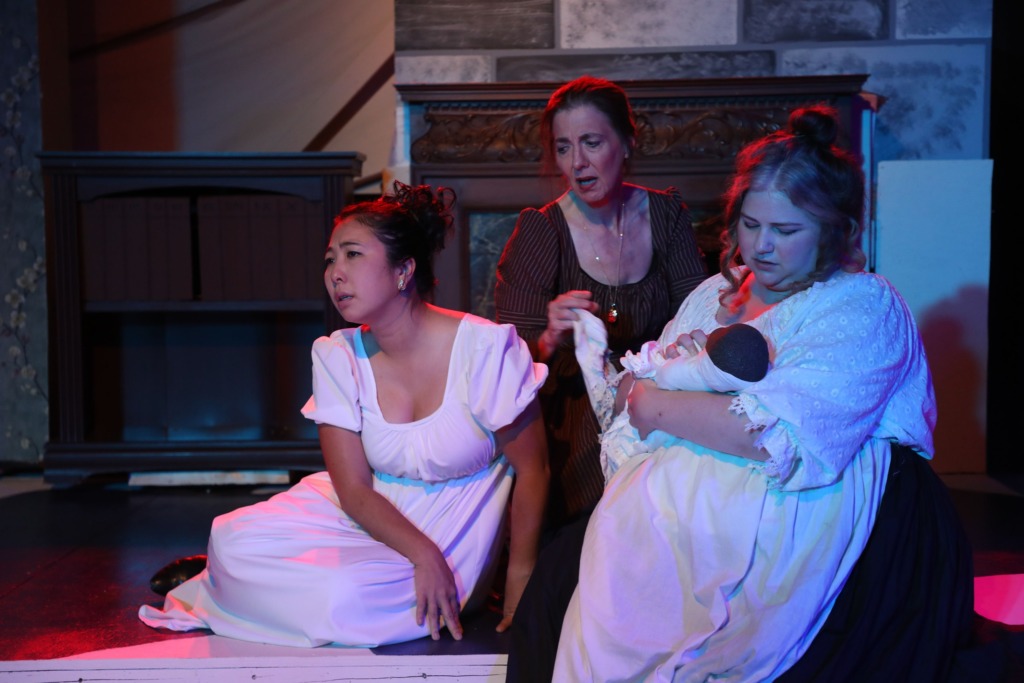
Similarly directed by the tome woven by Mary is the character of Elizabeth, played by Mika J. Nakano. Nakano beautifully portrays the complicated simplicity of her character as a young woman intelligent of mind but confined to the structure of the oppressive societal laws and aware of what she has to do to survive.
But all is not suffering; well, not for a few moments at least. Young William Frankenstein is played by Kay Black and serves as a short reprieve from the malaise of the sorrowful action on stage in their charming performance of a child “not yet six.” Black wonderfully encapsulates the joy and wonder of a small child as to imbue the essence of innocence.
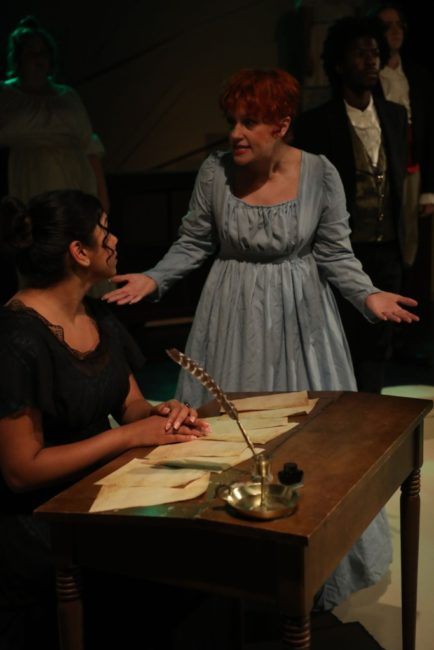
The ambiance of the production is also well set. Scenic design by Brad Norris, and Sound by Madeline “Mo” Oslejsek wonderfully pay tribute to the action on stage with the inclusion of inverted pages of the science fiction novels which came decades after Shelley’s novel adorning the stages’ borders and walls of Mary’s room, while lithe quartet renditions of contemporary pop-music compliment the action on stage.
It is not unusual for a theatre company to advertise that they are “proud to present” whatever production they are currently showcasing. But in this case, The Strand Theater should be proud of Mohlman’s rendition of Mary Shelley’s Frankenstein. While it may not be the version many are familiar with, and there are liberties in the story telling to connect with themes and interpretations of the difficulties of women’s experiences (both in the Regency Era and modern day), Mohlman’s play does a fine job in reading between the lines of Shelley’s original work and focusing on the influences which subconsciously and consciously affect many women’s experiences.
Running Time: Approximately 2 hours, including one intermission.
Frankenstein plays through September 25th, 2022 at the Strand Theater, 5426 Harford Rd in the Hamilton-Lauraville neighborhood of Baltimore, MD. Tickets are available by calling the box office at (443) 874-4917 or in advance online.

